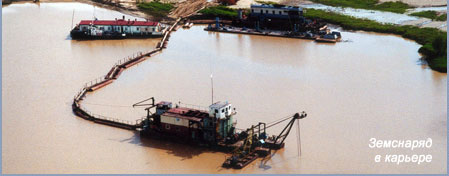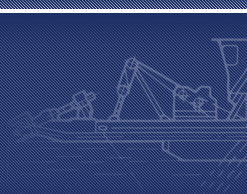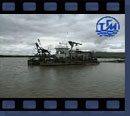English
|
| English |
|
|
HYDRAULIC EARTH-MOVING: QUALITY, EFFICIENT PERFORMANCE, ENVIRONMENTAL SECURITY
In 2009 it was seventy-one years since the method of hydraulic earth-moving had been first implemented in transport construction.
The hydro-mechanical technology was created originally as a single-functional branch within the system of Railway Ministry for railway crib material hydraulicking and construction of new railways. Eventually the technology became an integral part of the national economy as a method for construction of projects implying large scopes of earthworks, construction of projects in hard-to-get-at places and also in places where no dry borrow-pits are available. Besides hydraulic earth-moving is marked by certain decisive superiorities compared to other methods of construction.
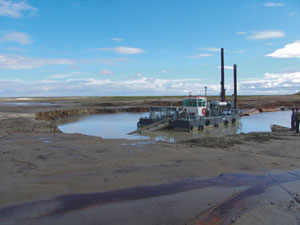 |
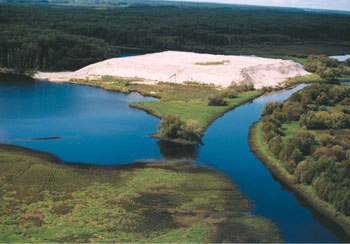 |
|
|
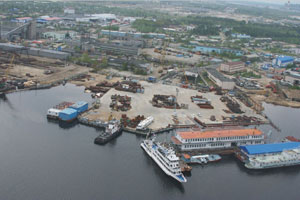
The history of hydro-mechanical operations has accumulated the experience in construction of engineering structures using sandy soils with a high content of clay and sill particles making it possible to avoid removal and refill of the lower stratum. Hydraulicking has been widely used for construction of gentle-slope inundated embankments pro-viding a stable roadbed without additional slope protection as well as the possibility to run service lines along them. Also the hydro-mechanical technology (trestle-free thickener-involving hydraulicking without intake wells) has been used in construction of highly spec ial i zed structures.
The hydraulic method has been recognized in many countries 88 highly effective in performance of earthwork operations and some mining operations.
This method is most effective for shorter periods and larger scopes of operations such as bridge approaches, river developments, and hydraulicking of aquatic areas for both sea ports and river ports, dredging operations etc. |
This method is essential for large projects in constructional engineering, industrial construction, also railway and highway construction. In certain operations such as mining of water-bearing sand and gravel aggregate deposits hydraulicking is in most cases the only one effective procedure making it possible to perform preparation of the massive material as well as its tossing, decontamination, hydraulic classification and grading.
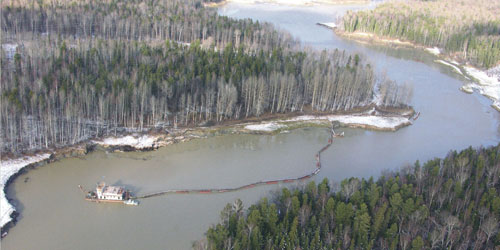
|
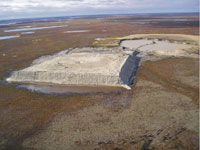 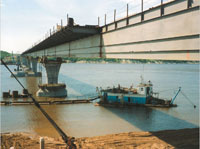
Dae to the accumulated experience and extensive material and technical facilities hydromechanic method of earth-moving is efficiently used for the following operations:
- railway construction, highway construction (roadbed hydraulicking), dam and bridge-approach hydraulicking, hydraulicking for industrial and civil construction sites,
- oil-field and gas-field construction,
- earth excavation in construction of aquatic areas for sea- and river-ports, river dredging operations, water reservoirclean-up,
- sapropel production,
- coombe and bottom land filling.
- entombment hydraulicking on dangerous disposal sites and places of waste production storage,
- navigation and irrigation canals, aquatic areas, sea- and river-ports,
- dike dam and bank-protection beach hydraulicking.
- dam construction and topping, dump construction, ash disposal and transportation,
- overburden mining on mineral deposits,
- flooded field nonmetalliferous structural and crib material mining, upgrading and classification,
- moulding sand and glass-making sand production,
- recreation site construction, artificial water reservoir construction.

|
|
HYDRAULIC EARTH MINING, TRANSPORTATION AND LAYING AS AGGREGATE TECHNOLOGY
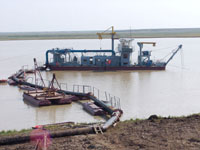 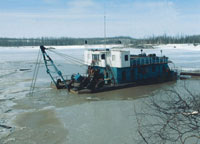
Hydraulic earth-moving has the following advantages:
- low reference fuel energy-output ratio.
- shorter setting time for weak base structures due to higher outer forces while hydraulicking.
- possibility of earth natural classification in the process of depositing.
- possibility to develop both flooded and dry borrow pits (water jet with the use of dredger pump method) and (consequently) larger borrow pit development, canal development (without draining or water drawdown operations),
- possibility of more intensive earth conveyance to restricted areas (including canyons, structure pockets etc.) not easily accessible with motor transport,
- no tote roads are required between pits and construction sites,
- significantly smaller allot land area due to deeper pits.
|
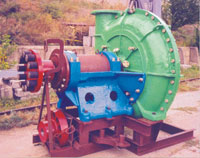 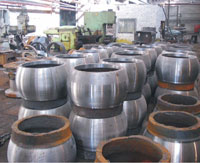 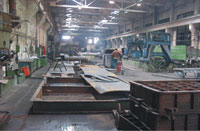
|
Basic hydromechanical hardware manufactured by Tsimliansky industrial enterprise
Dredgers |
| Dredger modell |
800 - 40 |
80-40ДГ |
1400 - 40 |
1400 -40Д |
180 - 60 |
1400 -40Д |
300 - 70 |
220 - 60 |
Project № |
461 |
460 |
481 |
480 |
299 |
Ц480 |
цзоо |
Ц220 |
Overall dimensions, m |
18/ 7. 2/1.5 |
18/ 7.2/1.5 |
18/ 7.2/1.5 |
16/
7.2/1.5 |
22/ 9.2/1.5 |
22/7.2/ 1.75 |
29/ 8.2/1.75 |
22/8.2/1.75 |
Sinkage in transport position, m |
0.75 |
0.82 |
0.79 |
0.95 |
0.83 |
0.95 |
0.9 |
0. 85 |
Suction dredger
capacity, m3/h |
800 |
800 |
1400 |
1400 |
2000 |
1400 |
3000 |
2000 |
Dredger discharge head, m |
40 |
40 |
40.70 |
40 |
63 |
40 |
71 |
63 |
Installed power, kVV |
230 |
230 |
360 |
360 |
1020 |
360 |
1300 |
1050 |
Electric power installation |
Е1-6Кв |
6hla 23/30 |
Е1-6Кв |
8hla
23/30 |
Е1-6Кв |
8hla 23/30 |
Е1-6Кв El-ЮКв |
Е1-6Кв El-ЮКв |
Mec/hyd dredging depth, m |
9/12 |
9/12 |
9/12 |
9/12 |
10/20 |
9/12 |
15/20 |
15/20 |
Slurry pipeline diameter, m |
300 |
300 |
400 |
400 |
500 |
400 |
500 |
500 |
Displacement tonnage |
79 |
83 |
79.5 |
87.5 |
150 |
91.6 |
145 |
135 |
Suction pump model |
ГруТ
800/40 |
ГруТ
800/40 |
ГруТ
1400/70 |
ГруТ
1400/40 |
ГруТ
2000/63
16ГруТ
-8.М |
ГруТ
1400/40 |
ГруТ
3000/71 |
ГруТ
2000/63 |
Suction dredgers
Suction dredgers model |
ГруТ
860/40 |
ГруТ
1406/40 |
ГруТ
4000/71 |
ГруТ
3000/72 |
ГруТ
2000/63 |
Project № |
423 |
424 |
420 |
Ц500 |
Ц510 |
Capacity
(by water), nvVh |
800 |
1400 |
4000 |
3000 |
2000 |
Discharge head |
40 |
40 |
71 |
72 |
63 |
Revolutions per minute |
750 |
750 |
500 |
750 |
590 |
Drive power, kw-hr |
230 |
330 |
1600 |
800 |
630 |
Efficiency factor |
70 |
75 |
65 |
71 |
71 |
Rotor wheel diameter, mm |
700 |
740 |
1360 |
1100 |
1050 |
Flow section, mm |
150 |
150 |
215 |
180 |
180 |
Specified weight, t |
3110 |
3550 |
13000 |
8100 |
7900 |
|
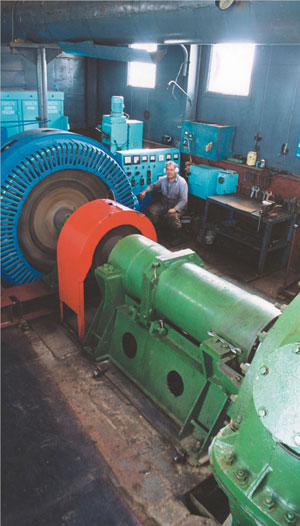 |
|
|
|
Компания участвовала в строительстве крупных и сложных объектов:
Куйбышевский, Волгоградский, Цимлянский гидроузлы.
Волго-Донской судоходный канал, Каракумский канал, Аму-Бухарский канал, Волго-Балтийский водный путь.
Инженерная защита от подтопления городов Ульяновска, Казани, Энгельса, Волжска, Камышина.
Железные дороги Тюмень – Тобольск – Сургут, Сургут – Уренгой, Рыбное – Узуново, Архангельск – Корпогоры, Асино – Белый Яр, Хребтовая – Усть-Илимская, Байкало – Амурская магистраль.
Автомобильные дороги Москва – Минск – Брест, Тюмень – Тобольск, Ростов – Батайск, Чита – Хабаровск, Комсомольск-на-Амуре – Хабаровск, Набережные Челны – Казань, Казань – Челябинск.
Спрямление русла реки Москвы в Нагатино.
Канонерский тоннель в Ленинграде,
Замыв оврагов в Новосибирске.
Восточный порт в Находке.
Подходы к большим железнодорожным и автодорожным мостам.
Намыв территорий под жилищное строительство во многих городах страны.
Намыв площадок под кустовое бурение и автодорог к ним на нефтяных и газовых месторождениях Западной Сибири в условиях Крайнего Севера и Заполярья.
|
|
|
|
